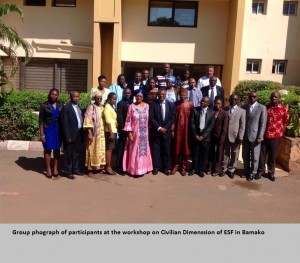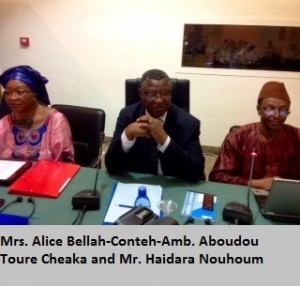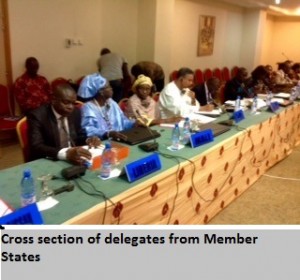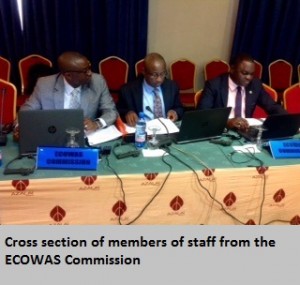 The Economic Community of West African States (ECOWAS) has organized a two-day workshop to sensitize selected focal persons from its 15 Member States and civil society organizations led by the West Africa Network for Peacebuilding (WANEP) on the roles of the Civilian Dimension of the ECOWAS Standby Force. The event was held between 12th and 13th October, 2015, in the Malian capital, Bamako. The workshop was organized to primarily enhance the knowledge of the focal points about the existence of the civilian dimension of the ESF and the civilian standby capacity roster. The Economic Community of West African States (ECOWAS) has organized a two-day workshop to sensitize selected focal persons from its 15 Member States and civil society organizations led by the West Africa Network for Peacebuilding (WANEP) on the roles of the Civilian Dimension of the ECOWAS Standby Force. The event was held between 12th and 13th October, 2015, in the Malian capital, Bamako. The workshop was organized to primarily enhance the knowledge of the focal points about the existence of the civilian dimension of the ESF and the civilian standby capacity roster.
In his remarks at the meeting, the Special Representative of the President of the Commission to Mali, Amb. Aboudou Toure Cheaka, said ECOWAS will continue to provide coordinated intervention during crisis in any member state as well as facilitate peace building and provide succor to countries that are coming out of conflict situation in the Region. This, he said, can be better realized when the multidimensional aspect of Peace Support Operations (PSOs) are taken into consideration so as to ensure full participation of all components, especially, the civilian actors. The Special Representative said clear role and responsibilities must be assigned to various implementing components. He said it is also very important for all stakeholders to implement the policies and strategies of intervention as planned as well as to monitor and evaluate all operations for better lesson learned.

Also speaking, the Deputy Director of African Affairs and Focal Person, Ministry of Foreign Affairs of Mali, Mr. Haidara Nouhoum, said the workshop was coming at the right time when civilian dimension in peace support operations were being emphasized all over the world because of its relevance in ensuring conflict management and resolution as well as assuring sustainable peace and development in states coming out of crises. Mr. Haidara added that the civilian dimension is even more critical in situations such as that of Mali where complex dimensions were brought to bear on the conflict.
In her presentation, the Head of Civilian Component of the ECOWAS Standby Force, Mrs. Alice Balla-Conteh, gave an insight into the civilian dimension of peace support operations and a summary of the regional policy for integrating civilians into the ECOWAS Standby Force.

Mrs. Ballah-Conteh said increasing awareness and support for the civilian dimension of the ESF and sensitization of participants on the development of the Civilian Standby Roster of the African Standby Capacity, will go a long way in achieving the objectives of setting up the Standby forces. She said the workshop will also afford the opportunity to create awareness on deployment of PSOs in West Africa and keep the national ministries and civil organizations informed on the civilian dimension agenda of the ECOWAS Commission as well as to establish a coordination strategy with focal points in the performance of their roles.
In his own presentation, the ESF Training and Rostering Officer, Mr. Danjuma Aku, informed participants that the various peace missions carried out by ECOWAS across Member States of Liberia, Sierra Leone, Cote d’ Ivoire, Guinea Bissau and Mali have achieved a lot including: Political Agreements, Deployment of Peace Keeping Force, Appointment of Special Representatives and Stabilization of the Situation. Others are Logistical Support for Elections, Economic Revival and Security Sector Reforms. He added that, ECOWAS relies on the mandate of Article 58 of the Revised ECOWAS Treaty of 1993 which provides for regional security to mobilize and deploy peace missions with the authority of Heads of States and Government of the region.

Similarly, the ESF Planning and Coordination Officer, Mr. Bekaye Coulibaly, carried participants through the strategies and processes of deploying civilians in missions within the ESF. He highlighted the sequencing of deployment as an important factor in the successful implementation of missions. He mentioned some of the civilian skills that are relevant to peace missions to include, Political Affairs, Planning & Coordination, Legal Advice and Public Information. There are also Human Rights, Electoral Affairs, Civil Affairs, Gender, Child Protection, Legal Affairs, and Humanitarian Liaison.
While sharing his experience, the African Union (AU) Senior Rostering Officer, Mr. Eustace Chiwombe, gave a breakdown of how the AU African Standby Force (ASF) works and how the African Standby Capacity (ASC) Roaster is used to store data of qualified candidates with the aim of deploying them to the field once the need arises. He also highlighted the ASC structure which provides for common database system inter-linking the AU and the regional bodies, a common screening process as provided for in the Selection Guidelines Manual and a common training directive.
Presenting a paper titled, Expected Roles of the Focal Points in the Development of the Civilian Dimension of the ESF, the ECOWAS Standby Force Logistics Officer, Mr. Baba Midjibe Ligbi, listed the roles of the focal points to include: populating the ESF Roster/ASC and sensitizing Member States on civilian dimension of ECOWAS PSOs. He added that the focal points are also expected to provide guidance and technical advice as relevant to qualified ECOWAS citizens who wish to be placed on the standby roster.
At the end of the workshop, participants agreed to encourage the focal points to seize opportunities to share information and sensitize citizens on role of the civilian dimension of the ESF and the creation of synergy among focal points in order to maintain good level of information sharing for optimal utilization as well as development of guidelines to guide the focal points on their roles and responsibilities regarding the civilian dimension of the ESF. |







